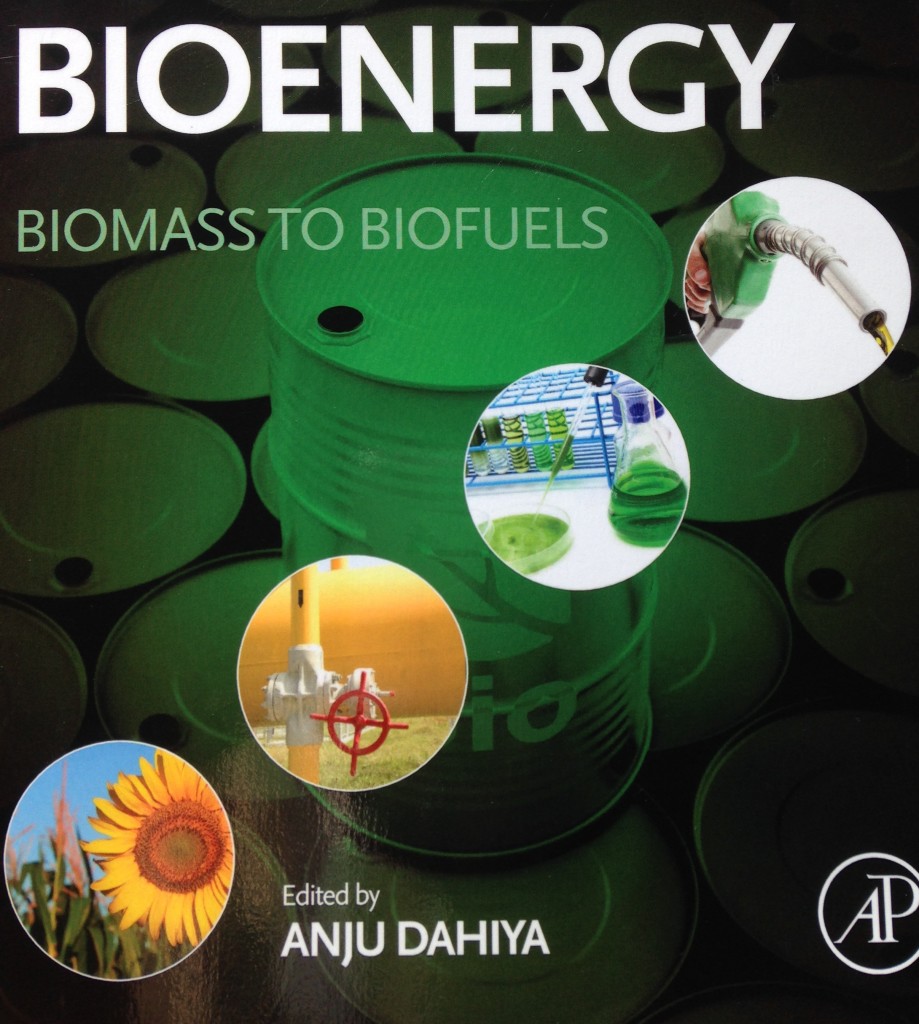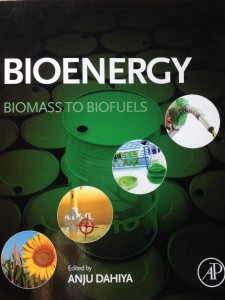Bioenergy: Biomass to Biofuels; is an innovative new textbook that provides insight into the potential and current advances and benefits of biofuel. Contributions include an extensive list of well-respected university extension programs, such as The University of Vermont Research Extension, as well as numerous national organizations including the US Department of Energy’s National Renewable Energy Laboratories. The text is edited by Anju Dahiya, cofounder of General Systems Research, LLC and lead biofuels instructor at the University of Vermont’s Rubenstein School of Environment and Natural Resources, both of which stand as leaders in cutting-edge topics such as microbial fuels and biogas. The chapters of the book are divided into solid, liquid and gaseous biofuels, and further explore cost-effective production as well as discussions covering economics, environment and policy.
Organized into seven accessible sections, Bioenergy: Biomass to Biofuels begins with an in-depth overview of the transformation of biomass into biofuels. Once the basics are covered, readers move on to the technical applications of solid feedstocks, such as wood and grass, and their transformation into biofuels. The following section discusses biomass to liquid biofuels—text focuses on oilseeds, cellulose ethanol, and algae as feedstocks. Anaerobic digestion is explored in a section outlining gaseous fuels and bioelectricity and focuses primarily on livestock manure feedstocks. Throughout the chapters, the tradeoffs and benefits of these different feedstocks are outlined through deeper analysis.
Multiple chapters focus in detail on conversion pathways for cost effective biofuel production. The myriad of topics include basic biodiesel production efficiency, converting petroleum-based infrastructure into biorefineries, reducing enzyme cost through varying combinations, and sustainable aviation biofuels. The text concludes with a robust section that connects biofuels to a big picture perspective—economics, sustainability, environmental implications, and policy are examined closely in relation to renewable resources, future uncertainties, and entrepreneurship.
Bioenergy: Biomass to Biofuels is structured to meet the needs of professionals finding their way in the field, students in need of an introduction, and instructors establishing a course on biofuels. Case studies on provided topics are found at the end of every section and are based on documented implementation projects. Bioenergy: Biomass to Biofuels is available for purchase on the Elsevier publisher website. Editor Anju Dahiya, owner of General Systems Research in Burlington, Vermont and is a Vermont Bioenergy Initiative grant recipient to advance research and applications of converting algae into biofuel.
Vermont is an indisputable leader in sustainable job growth and renewable energy, punching well above its weight in the fight against global climate change. It is because of opportunities like the upcoming summit, Creating Prosperity & Opportunity Confronting Climate Change, that local business, government, non-profit, and higher education leaders will come together to focus on advancement of sustainable job growth in fields that have a positive impact on the environment and local economy. Organizations including the Vermont Energy Investment Corporation, Renewable Energy Vermont, Green Mountain Power, University of Vermont, Energy Action Network, several government agencies, and multiple renewable energy businesses will converge at Vermont Technical College on Wednesday, February 18th for Vermont’s climate change summit sponsored by the Vermont Council on Rural Development. The day will commence with a keynote address from Vermont Governor Peter Shumlin who will speak about “Vermont as Climate Economy Leader.” The recently reelected Governor’s inaugural address, focused heavily on energy and the environment and the summit provides an opportunity for Vermonters concerned with regional climate change to learn more about his upcoming plan of action.
A “Climate Science Fishbowl” will follow, focusing on the effects regional and global climate change will have on Vermont’s future. Moderated by Mark Johnson, host of WDEV’s The Mark Johnson Show, the panel will feature Jon Erickson of Rubenstein School, UVM, Alan Betts of Atmospheric Research, and Gillian Galford of VT Climate Assessment, UVM. Two sets of breakout sessions round out the rest of the day; the first focusing on “climate economic policy” followed by “ideas for action” in the afternoon. Those interested in bioenergy might elect to attend breakout sessions such as “Advancing Community-Based Climate Action” moderated by Johanna Miller of VECAN and the VT Natural Resources Council or “Developing Ubiquitous Distributed Energy” moderated by Chuck Ross, Secretary of VT Agency of Agriculture, Food & Markets. Additionally, “Spurring Research and Development for New Technologies in Vermont” moderated by Ted Brady, USDA Rural Development seems to complement the Vermont Bioenergy Initiative’s work building the new frontiers in bioenergy for the State of Vermont. To register and for a complete schedule visit: http://vtrural.org/programs/climate-economy/summit.








